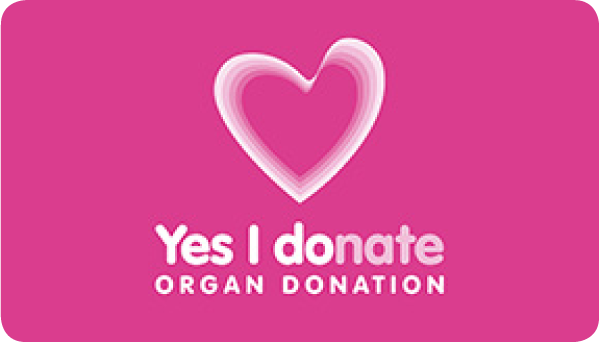Kidney Disease
What is Chronic Kidney Disease (CKD)?
CKD means that your kidneys are not working properly. Chronic means that the condition is likely to last for the rest of your life. Your kidneys are unlikely to start working again. There is no cure for CKD but dialysis and transplantation are very effective treatments that take over the work that your kidneys normally do. Some people choose not to have dialysis or a transplant. This is called conservative management.
How did you find out that I have CKD?
The problem with your kidneys may have been discovered through one of the following ways:
- a routine urine test
- a very high blood pressure reading
- a routine blood test
If your doctor finds something is wrong with your kidneys, they may do more tests. This may include more blood tests, x-rays, ultrasound scans and possibly a kidney biopsy (where a tiny piece of tissue is removed from your kidney and examined under a microscope).
These tests are needed to see the exact damage to your kidneys and to determine if any specific treatment is necessary.
What are the symptoms of CKD?
In the early stages of CKD you often have no symptoms. Later on you may have some or all of these symptoms at different times:
- tiredness
- lack of appetite
- sickness
- cramp in your legs
- itching
- swollen ankles
- shortness of breath
- changes to sleep patterns
- less interest in sex
- feeling cold.
Many of these symptoms will improve when you start treatment.
Can CKD happen with no symptoms?
Yes, often people with early stage CKD do not feel unwell and may not have any significant symptoms. You might only find out from a routine blood test that your kidneys are not working properly and that you need to start some treatment.
What causes CKD?
There are a lot of conditions that can damage your kidneys but often CKD is a consequence of the normal ageing process as kidneys scar gradually with age and are unable to repair themselves.
Here are some of the other common causes:
- Diabetes – a condition in which there is too much sugar in the blood. It can be treated by insulin, tablets or diet. It is the single most common cause of CKD and usually occurs in people have had diabetes for longer than ten years.
- High blood pressure – also called hypertension.
- Glomerulonephritis – a general term meaning the kidneys become inflamed and damaged. The reason is often not known.
- Pyelonephritis – an inflammation of the kidneys’ drainage system, usually caused by an infection.
- Renovascular disease – a narrowing of the arteries that supply blood to the kidneys. It is caused by smoking and too much cholesterol in the body.
- Obstructive nephropathy – a blockage in the flow of urine which causes damage to the kidneys, most common in men over 60. It is often caused by the prostate gland becoming enlarged. In rare cases it happens to women and is connected to gynaecological problems.
- Polycystic kidney disease (PKD) – a condition which runs in families. If you have PKD you will have lumps, known as cysts, on your kidneys.
The National Kidney Federation website has information as well as leaflets about the different causes of kidney disease. In addition you will find more technical information on the Edinburgh Royal Infirmary Information website.
Sometimes it is not possible to find out why your kidneys have failed but this does not usually affect your treatment.
How do you know the extent of my kidney damage?
When we do your regular blood tests at clinic, we can use the results to calculate your estimated Glomerular Filtration Rate (eGFR). This gives us a rough idea of the amount of remaining healthy kidney function provided by your kidneys. Young people with completely healthy kidney function will have an eGFR of 90% or more but people can remain well with much less than this. You might start to experience some significant symptoms once your percentage of remaining kidney function is down to 20- 30% of normal. Once your kidney function reaches 10-12% of normal, you will need to have a specific treatment in the form of dialysis, transplantation or conservative management.
Most people looking at this website will be at stage 4 or 5
What is Established Kidney failure?
As described in the previous section, doctors divide chronic kidney disease into five stages, based on the kidney function shown by your blood tests. If your blood tests show kidney function of 15 percent or less, this is called chronic kidney disease stage 5, also known as established kidney failure. You may also hear it called end stage kidney failure.
If you have established kidney failure, you may get symptoms because of waste building up in your blood. But this doesn’t happen to everyone. You may not get symptoms until your kidney function is much lower than 15 percent.
How many people have establish Kidney Failure?
Around 3.5 million people in the UK have chronic kidney disease stage 3 to 5.
Around 1 or 2 people in every 100 people with chronic kidney disease stage 3A or 3B will go on to get established renal failure.
About 50,000 people in the UK have had kidney transplants, are having dialysis for established kidney failure, or are waiting for a kidney transplant.
Can I slow down the damage to my kidneys?
The most important thing you can do is to come to clinic appointments, no matter how you feel, and to keep taking any prescribed medications. You can also help by:
- keeping your blood pressure down
- healthy eating
- taking regular exercise
- giving up smoking
- reducing your alcohol intake
- if you are diabetic, getting your diabetes under control
We may also prescribe you some medications to help protect your kidneys and give you advice on avoiding medications that may further damage your kidneys. For a small percentage of patients who have more unusual causes of their kidney problem, there may be some additional, more specific treatments to help their kidneys, such as medications to suppress their immune system.
What will happen to me in the future?
Many people with CKD enjoy a good quality of life. However, no one can accurately predict the future. Your outlook will be affected by your age and whether you have other medical conditions, such as heart disease or diabetes. Statistics can give you a general indication about survival for patients with CKD, but these only give an average and do not reflect the outcome for each individual.




